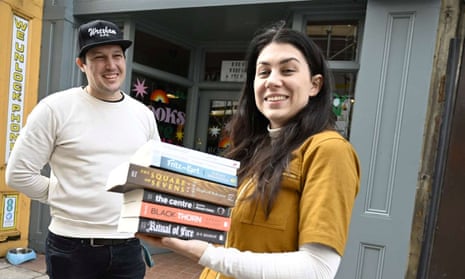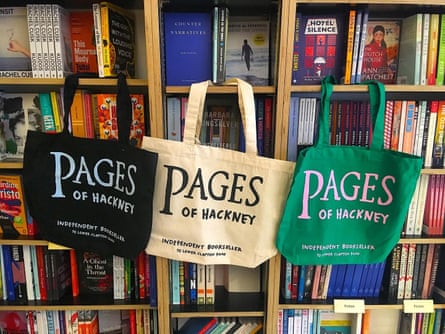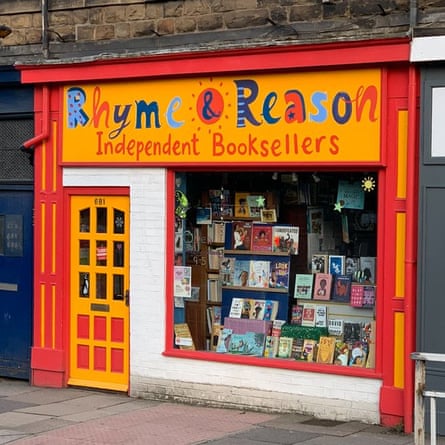
‘We’ve rediscovered the joy of reading’: how customers are rescuing UK bookshops
A bookseller in Kent has gone viral after tweeting a picture of her empty shop. Here, other retailers explain how they are surviving – even thriving – when many people are counting every penny
A vase of hydrangeas sits among a crop of the latest releases, including What Writers Read and Blake Morrison’s Two Sisters. There is a cosy rug and a bright window display. It looks like a lovely bookshop. What there aren’t, however, are any customers. “Winter is killing us, it’s soo quiet,” tweeted Sapphire Bates, the co-owner of Book Bodega in Ramsgate, Kent, on Saturday afternoon. “We need to make £800 by Tuesday to pay our bills.”
Her tweet has since been viewed 6m times and retweeted nearly 12,000 times. She has had messages of support from Ian Rankin, Sue Perkins and the historian and podcaster Tom Holland. Although she is reportedly still doing the sums, Bates thinks the support that has flooded in will cover the bills.

But there is no getting away from the fact that this is a tricky time for many independent bookshops. “The massive cost increases bookshops, like all other businesses, are facing is presenting them with an enormous challenge this year,” says the aptly named Benedicte Page, the deputy editor of the Bookseller magazine. “Margins are tight in bookselling at the best of times – and if customers are also hit by the cost of living crisis, that squeezes their sales.”
Book Bodega is not the first indie to call for help: many have taken to social media to try to mobilise book lovers around the world. In December 2021, the UK’s first specialist black bookshop, New Beacon Books, raised £50,000 in just a few days after announcing it would be forced to close its store in north London if it didn’t get help. Even some of the biggest names in bookselling have put out pleas. In October 2020, at the height of lockdowns, the legendary Shakespeare and Company in Paris begged for help, as did downtown Manhattan’s Strand bookstore.
John Westwood remembers the day in 2020 when his shop in Hampshire, The Petersfield Bookshop, issued its own plea. “It was January; it was raining and stormy outside,” he says. The tweet read: “Tumbleweed … Not a single book sold today … £0.00 … We think this may be the first time ever …” For a bookshop that had been running since 1918, that was no small claim. Neil Gaiman and others picked up the tweet.
“We came in the next day and we had all the international and national papers and TV, radio, CNN; it felt like a film set for two days,” he says. But the impact went deeper: “It made me cry, if I’m honest,” says Westwood, whose father bought the business in 1958. “Without it, I think we wouldn’t be here now.”
The result, Bates might be heartened to hear, was tangible, with sales quickly following. Where they would usually have expected between two and three online sales, by the end of the week the figure was at 450. “We had about 1,000 emails; people were sending us cash, cheques; footfall in the shop went up by 10 times and our Twitter following went up from 1,100 to 22,000 in the space of four days.”

Westwood thinks the bolstered online presence was the enduring help, once the cameras had moved on. Nonetheless, he says, “it’s a struggle running a bookshop”. Their monthly electricity bill has doubled, from £1,000 to £2,000. “That’s with the government aid – goodness knows what’s going to happen at the end of March. All the other running costs of the shop have gone up. Even going out and collecting books, the diesel costs have gone up. It’s madness.”
But it’s certainly not all doom and gloom in the bookselling industry. The picture is nuanced, with the number of independent bookshops in the UK and Ireland reaching a 10-year high in 2022. For Jo Heygate, the manager of Pages of Hackney in east London, this reflects a buoyant scene: “Our feeling is that, since the pandemic, people rediscovered the joy and time for reading. They want to support their local bookshop rather than Amazon. Our sales reflect this; we have a busy website and a busy shop and we run events in our shop and in our community.”

Some of it is down to location. “It’s always very variable between bookshops, because they each serve their local communities and every locality has particular factors at play,” says Page.
Rhyme and Reason, an independent children’s bookshop in Sheffield, is in a good spot, near several schools, and has continued to see lots of trade. But the manager, Sadie Hatch, has noticed that people have less money to spend than once they might. Also, the prices of books have gone up noticeably in the past couple of years. “Where you used to be able to get a children’s book for £5.99, £6.99, they’re now £7.99 or £8.99,” she says. This can make all the difference for people feeling the pinch.
Westwood is worried about the future of his shop, as well as what a landscape with fewer bookshops might look like: “Once you take shops away, you take access to nice books away from the general public,” he says. “Books are becoming the preserve of the rich.” With shops like his and Book Bodega, “people come in and touch and feel – you can’t replicate holding and smelling a book”.
“This is going to be a very tricky year for indies,” says Page. “Now is a really good time to go out and support your local bookshop, if you can.”
- SEO Powered Content & PR Distribution. Get Amplified Today.
- PlatoData.Network Vertical Generative Ai. Empower Yourself. Access Here.
- PlatoAiStream. Web3 Intelligence. Knowledge Amplified. Access Here.
- PlatoESG. Automotive / EVs, Carbon, CleanTech, Energy, Environment, Solar, Waste Management. Access Here.
- PlatoHealth. Biotech and Clinical Trials Intelligence. Access Here.
- ChartPrime. Elevate your Trading Game with ChartPrime. Access Here.
- BlockOffsets. Modernizing Environmental Offset Ownership. Access Here.
- Source: https://www.theguardian.com/books/2023/feb/28/weve-rediscovered-the-joy-of-reading-how-customers-are-rescuing-uk-bookshops
- :has
- :is
- :not
- :where
- $UP
- 000
- 06
- 07
- 08
- 09
- 1
- 10
- 100
- 11
- 12
- 13
- 14
- 15%
- 16
- 17
- 19
- 20
- 2020
- 2021
- 22
- 23
- 25
- 26
- 27
- 29
- 30
- 32
- 33
- 39
- 46
- 49
- 54
- 66
- 7
- 75
- 77
- 8
- 87
- 9
- 90
- 98
- a
- Able
- About
- access
- Ad
- After
- Aid
- All
- also
- Although
- always
- Amazon
- among
- an
- and
- Announcing
- any
- ARE
- around
- AS
- At
- away
- bbc
- BE
- beacon
- because
- becoming
- been
- BEST
- between
- Biggest
- Bill
- Bills
- Black
- body
- book
- Books
- border
- bought
- Bright
- business
- businesses
- busy
- but
- button
- by
- call
- came
- cameras
- CAN
- Cash
- certainly
- challenge
- claim
- Close
- CNN
- CO
- Collecting
- come
- Communities
- community
- company
- content
- continued
- Cost
- Costs
- counting
- Couple
- cover
- crisis
- crop
- Customers
- day
- Days
- December
- deeper
- deputy
- DID
- difference
- Display
- doing
- doom
- doubled
- down
- each
- East
- editor
- electricity
- emails
- end
- enduring
- enormous
- Even
- events
- EVER
- Every
- expected
- Explain
- facing
- fact
- factors
- false
- feel
- few
- fewer
- Figure
- Film
- First
- first time
- flooded
- following
- For
- forced
- four
- from
- future
- General
- general public
- get
- getting
- Go
- going
- gone
- good
- Government
- had
- happen
- Have
- he
- headline
- hear
- height
- help
- her
- here
- Hide
- High
- his
- Hit
- holding
- How
- However
- HTML
- http
- HTTPS
- i
- if
- Impact
- in
- Including
- Increases
- independent
- Indies
- industry
- International
- ireland
- Issued
- IT
- ITS
- January
- jo
- jpg
- just
- landscape
- latest
- less
- Life
- like
- lines
- LINK
- living
- local
- location
- lockdowns
- London
- Look
- LOOKS
- lovers
- made
- magazine
- make
- manager
- many
- many people
- massive
- May..
- me
- Media
- messages
- Messenger
- might
- mirror
- model
- money
- monthly
- moved
- Named
- names
- National
- Near
- nearly
- Need
- New
- next
- nice
- no
- None
- North
- noticeably
- now
- number
- october
- of
- on
- once
- online
- or
- Other
- our
- out
- outside
- own
- page
- pages
- pandemic
- papers
- paris
- Park
- particular
- past
- Pay
- People
- picked
- picture
- plato
- Plato Data Intelligence
- PlatoData
- Play
- podcaster
- presence
- Prices
- public
- put
- quickly
- Radio
- rather
- reaching
- Read
- Reading
- really
- reason
- reflect
- reflects
- Releases
- result
- retail
- retailers
- reuse
- Rich
- right
- Run
- running
- sales
- saturday
- says
- scene
- Schools
- see
- sending
- serve
- set
- several
- Share
- she
- Shop
- shops
- since
- single
- sits
- slot
- small
- Social
- social media
- sold
- some
- Space
- specialist
- spend
- Spot
- store
- support
- Supporting
- Take
- taken
- tangible
- than
- that
- The
- The Future
- the world
- their
- Them
- There.
- they
- Think
- this
- three
- thriving
- time
- times
- to
- today
- touch
- trade
- true
- try
- Tuesday
- tv
- tweet
- two
- Uk
- us
- used
- usually
- variable
- very
- via
- viewed
- viral
- visible
- want
- was
- we
- Website
- week
- WELL
- went
- were
- Westwood
- What
- when
- white
- whose
- will
- window
- with
- world
- worried
- would
- writers
- year
- years
- you
- Your
- zephyrnet
